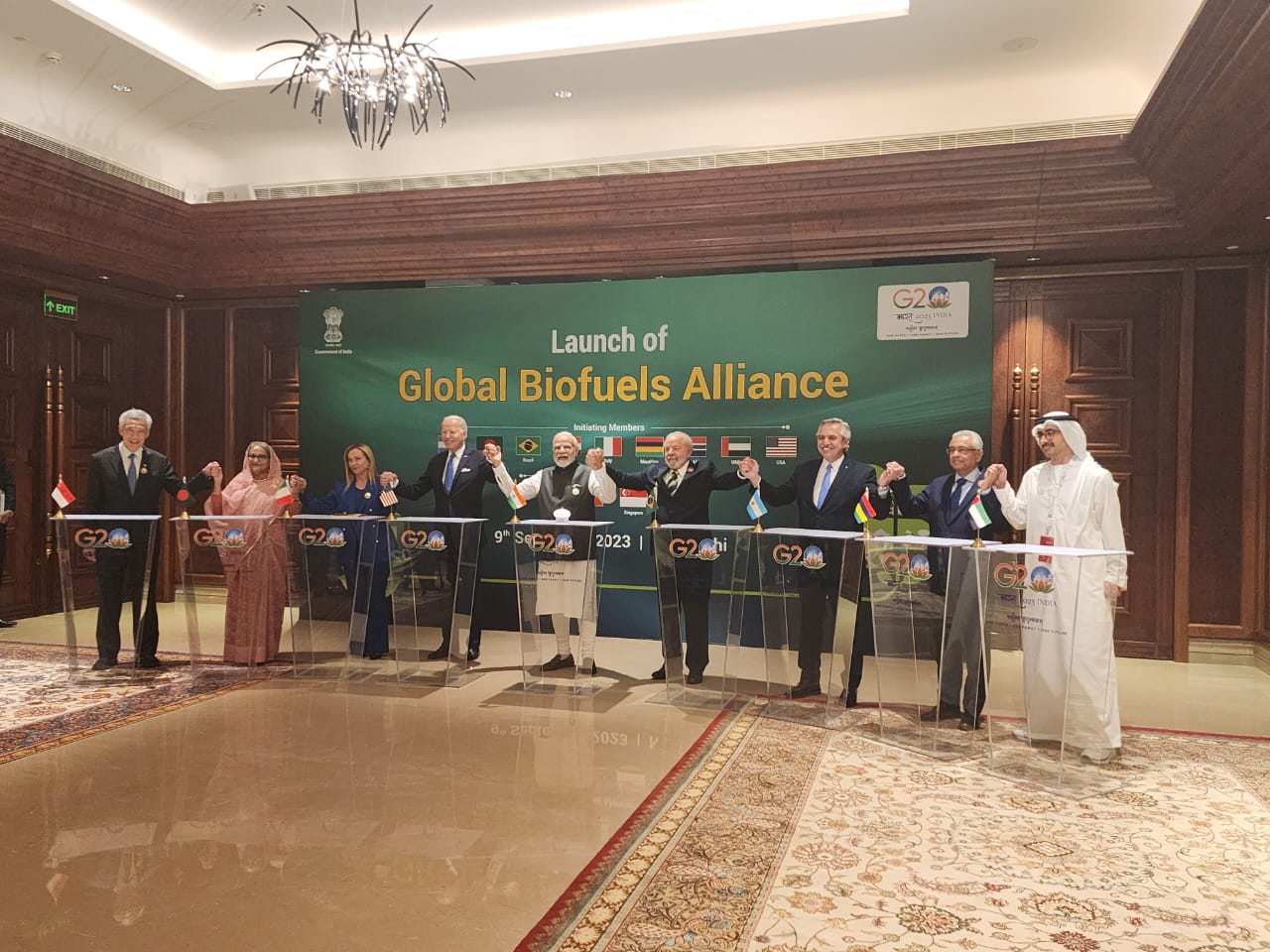New Delhi: The global energy sector marked a significant milestone on Saturday as Prime Minister Narendra Modi unveiled the Global Biofuels Alliance (GBA) during the G20 Summit, here.
The GBA, spearheaded by India, represents an ambitious initiative aimed at forging an alliance among governments, international organizations, and industry players. Its primary objective is to facilitate the widespread adoption of biofuels, a critical element in the transition towards cleaner energy sources. By uniting the world’s largest consumers and producers of biofuels, the GBA seeks to drive the development and deployment of biofuels, positioning them as a pivotal component in the global energy transition while fostering job creation and economic growth. This announcement underscores India’s proactive role as the President of the G20 and its commitment to representing the interests of the Global South.
The GBA’s comprehensive approach involves providing capacity-building activities across the entire biofuel value chain, extending technical assistance for national biofuel programs, and promoting the sharing of policy insights. It also intends to create a virtual marketplace that facilitates the connection between industries, nations, ecosystem stakeholders, and technology providers. Furthermore, the GBA aims to foster the development, adoption, and implementation of internationally recognized standards, codes, sustainability principles, and regulations, thereby incentivizing the adoption and trade of biofuels on a global scale.
This initiative promises manifold benefits for India. As a tangible outcome of its G20 presidency, the GBA will bolster India’s global standing. Additionally, the alliance’s collaborative approach will open up new avenues for Indian industries, offering opportunities to export technology and equipment. Furthermore, it will expedite the progress of India’s existing biofuel programs, such as PM-JIVAN Yojna, SATAT, and the GOBARdhan scheme. This acceleration will not only enhance the income of farmers but also create jobs and contribute to the overall development of India’s ecosystem.
The global ethanol market, valued at USD 99.06 billion in 2022, is projected to grow at a CAGR of 5.1% by 2032, eventually surpassing USD 162.12 billion by that year. The International Energy Agency (IEA) predicts a 3.5-5x growth potential in biofuels by 2050 due to the increasing focus on Net Zero targets, presenting a substantial opportunity for India to play a pivotal role in this transformative journey.
Countries and organizations which have already joined GBA:
19 countries and 12 international organisations have already agreed to join.
G20 countries (07) supporting GBA: 1. Argentina, 2. Brazil, 3. Canada, 4. India 5. Italy, 6. South Africa, 7.USA
G20 Invitee Countries (04) supporting GBA: 1. Bangladesh, 2. Singapore, 3. Mauritius, 4. UAE
Non G20 (08) supporting GBA: 1. Iceland, 2. Kenya, 3. Guyana, 4. Paraguay, 5. Seychelles, 6. Sri Lanka, and 7. Uganda have agreed to be initiating members of GBA, and 8. Finland
International organizations (12): World Bank, Asian Development Bank, World Economic Forum, World LPG Organization, UN Energy for All, UNIDO, Biofutures Platform, International Civil Aviation Organization, International Energy Agency, International Energy Forum, International Renewable Energy Agency, World Biogas Association.
GBA Members constitute major producers and consumers of biofuels. USA (52%), Brazil (30%) and India (3%), contribute about 85% share in production and about 81% in consumption of ethanol.
Partnership for Global Infrastructure and Investment & India-Middle East-Europe Economic Corridor
Prime Minister Narendra Modi and USA President Joe Biden co-chaired a special event on Partnership for Global Infrastructure and Investment (PGII) and India-Middle East-Europe Economic Corridor (IMEC), on 9 September 2023 on the sidelines of the G20 Summit in New Delhi on Saturday.
The event aimed at unlocking greater investment for infrastructure development and strengthening connectivity in its various dimensions between India, Middle East and Europe.
Leaders of the European Union, France, Germany, Italy, Mauritius, UAE and Saudi Arabia, as also the World Bank, participated in the event.
PGII is a developmental initiative aimed at narrowing the infrastructure gap in developing countries as well as help towards accelerating progress on SDGs globally.
The IMEC comprises of an Eastern Corridor connecting India to the Gulf region and a Northern Corridor connecting the Gulf region to Europe. It will include a railway and ship-rail transit network and road transport routes.
In his remarks, Prime Minister highlighted the importance of physical, digital and financial connectivity. He said that IMEC would help promote economic integration between India and Europe.
An MOU on IMEC was signed by India, USA, Saudi Arabia, UAE, European Union, Italy, France and Germany.


